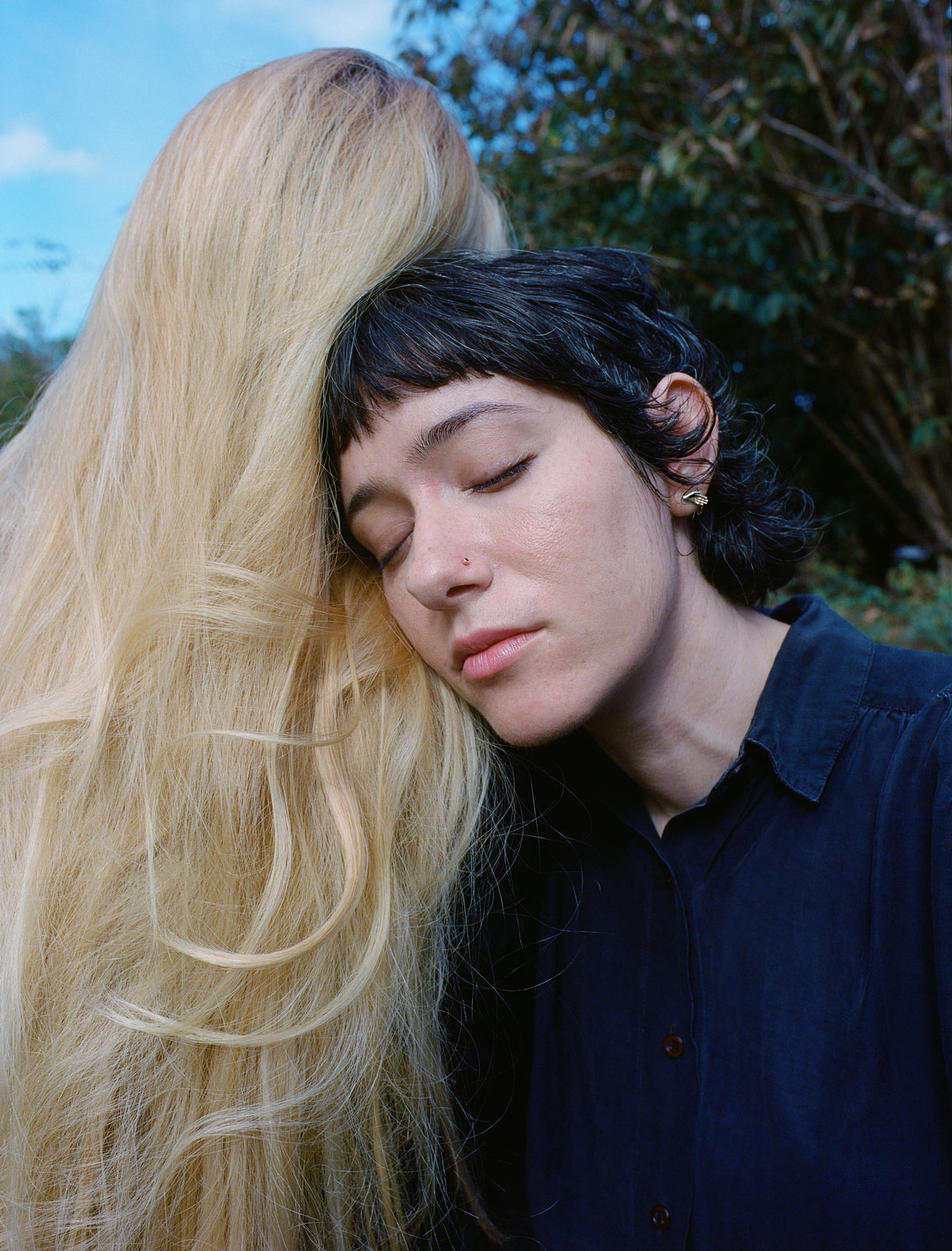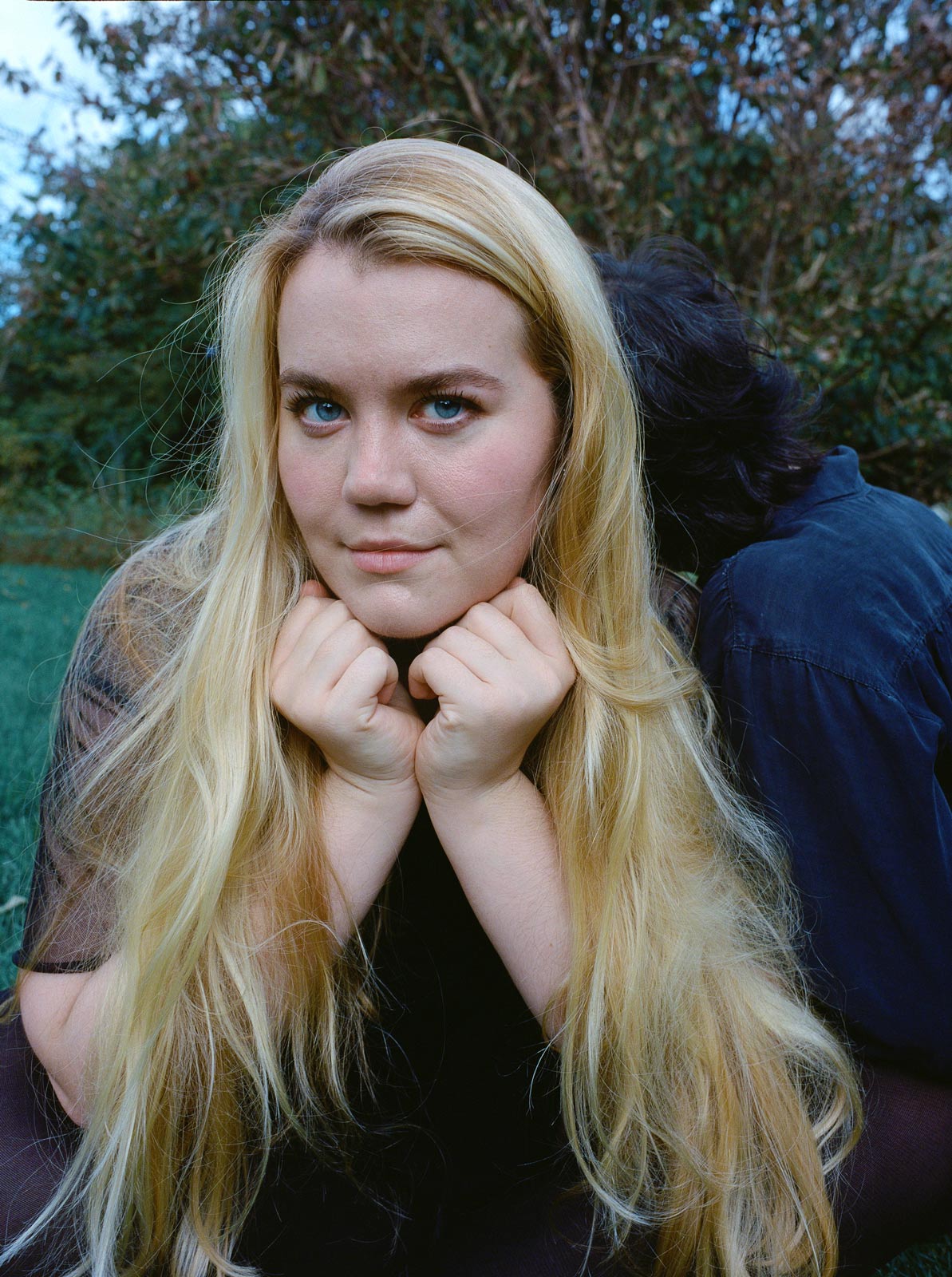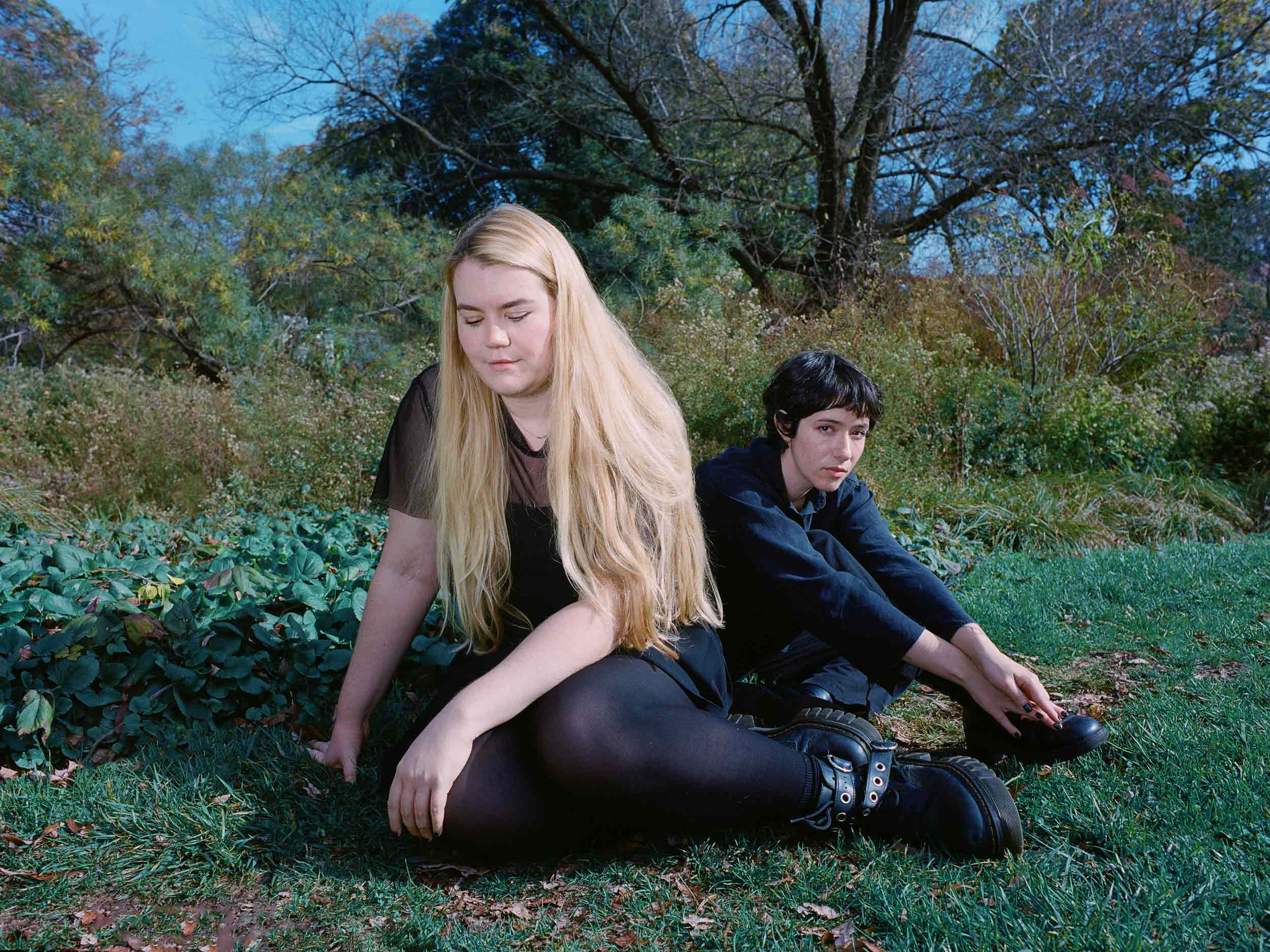Mina Walker and Kelley Nicole Dugan join Document to discuss grappling with their online personas, the mutual exchange of performance, and their latest album ‘All You Need Is Time’
Daisy the Great opens their sophomore album with “Time Machine,” the kind of soaring anthem that pierces through any cynicism, revealing whatever is soft, tender, and healing beneath. The song leaves you blurry-eyed and vulnerable—primed for All You Need Is Time, an album that contrasts the band’s ultra-catchy, stadium-ready sound with the uncompromising sincerity of their lyrics. Featuring the band’s signature double lead vocal harmonies by founding members Mina Walker and Kelley Nicole Dugan, the album is an epic of self-reflection, questioning, doubt, and discovery—a reminder that growing up is a lifelong process.
Released last month, All You Need Is Time is a testament to the artistry and talent of the band—Walker and Dugan are joined by Bernardo Ochoa, Matti Dunietz, Matt Lau, and Brie Archer—and to the prolific songwriting and formidable work ethic of its leads. This grind has characterized Daisy the Great from its inception; Walker and Dugan began the band in 2016, meeting daily during their final semester at NYU’s Tisch School of the Arts. As Walker and Dugan replaced the long hours of conservatory-style acting training with songwriting, Daisy the Great swiftly became a mainstay of the Lower Manhattan and Brooklyn music scenes, selling out venues like Williamsburg’s Union Pool. Their 2018 EP features “The Record Player Song,” which later blew up on TikTok, even inspiring a viral challenge and earning them a cult fanbase. This put Daisy on the radar of pop giant AJR (according to them, the chorus to the song was “the catchiest thing they had ever heard”), and the two bands collaborated on a new version of the song, “Record Player,” which has over 42 million streams on Spotify.
At Daisy’s core is the friendship between Walker and Dugan, a Scorpio and a Leo. Their comfortable intimacy is palpable during our interview in the casual way Walker plays with Dugan’s long, shampoo commercial-worthy hair as she thinks. This comradarie manifests in the band’s live performance; enthusiasm and earnestness radiate from each member as they play the songs with the kind of ease only engendered by complete trust. I caught Walker and Dugan in the whirlwind of their album release as they prepared for a lengthy tour opening for The Happy Fits (which will be followed by their first headlining tour in April). With the temporal theme of their latest album in mind, they have shared a playlist of songs featuring SASAMI, Lazylazy, Panther Hollow, and more. “This is a collection of songs that steady our hearts,” they say. “Time moves slower in a good way.”
For Document, Walker and Dugan discuss the journey of their latest album, their acting school origins, and how other creative mediums inform their music.
Maraya Fisher: How has your personal friendship evolved over the course of your musical collaboration?
Mina Walker: What brought us super close was writing together. I think that started a really healthy band relationship, because we began as collaborators and that morphed into a best friendship. There was a time when we were writing every single day—everything was [about the] band, all the time. We’ve gotten to a point where it has calmed down a bit… [Looks at Kelly] If you want to… I make Kelley finish my confusing sentences.
Kelley Nicole Dugan: … Mina will always talk into an absolute spiral hole and then be like, ‘Um, Kelley, you want to take over?’ [Laughs] No, I think that’s a good point. When we started the band, we used to post up in the lobby of the Marlton Hotel and just write every day. We were very proactive. I think what Mina was saying is that over the years, we now have a relationship that is work and play—not just work.
Mina: We get to treat it sort of like a day job, where we’re like, ‘Now it’s 6:00, so let’s stop working, and like, go get dinner and hang out as friends.’
Maraya: Where do you think that initial drive came from?
Kelley: I’ve always been a very driven person, even when I was a little kid. I think that once I feel like something is really fun, I just go really hard at that thing. That was met in the same way by Mina. Choosing something like making art, or writing—whatever your passion is—if you’re working so hard at it, it often doesn’t feel that horrible because it’s fun, you can sense progress, and it’s exciting.
Mina: The industry of acting was never something I felt super drawn to. I really liked acting and being in plays and doing film, but the actual structure of an acting career never interested me. I didn’t think about the fact that I could have a band until we started making music. The idea of that as a life felt more right than anything else had felt before. I just had this childlike excitement.
Maraya: Was there a moment early on where you received external validation that reaffirmed why you were doing this work or was it entirely internally motivated?
Kelley: For me, it was really internally motivated for a long time, and then we sold out Union Pool. I was so excited; I couldn’t believe it. We didn’t start the band thinking it was going to be our career, so it was really exciting when it started to grow more.
Mina: We would just call venues and be like, ‘Can we play?’ And they would be like, ‘Uh sure.’ The shows were where a lot of the validation to keep going came from for me too. Also, the energy from the band. I think that everyone was stoked on being in the band from the beginning. Before we recorded anything, we were in it for the live show.
Maraya: When was the point where it became clear that this could be a career?
Kelley: I think it slowly started to happen, the more we were able to reach milestones of the career path that we weren’t expecting to, like being able to book a tour or put out a record. The more we did it, the more we were able to take the progress of our career into our own hands. This was something we could really work on ourselves—more so than with acting, where you need to repeatedly audition. We started to work on writing music for other people as well, and working with producers for other projects. I felt like that was validating in terms of just feeling like my ideas were worthy.
Mina: It took me a while to think that our music was real music. There’s always that imposter syndrome, at least for me, not growing up with heavy music theory training. I was trained in singing when I was a kid but in terms of songwriting, a lot was trial by error and figuring it out as we went. Because of that, I think a lot of the songs are unique in their structure. Over time, I’ve become grateful for that. Writing with other people, it was nice to be like, my mind is actually contributing to this.
Maraya: I know that a lot of the songs on the album were written before the pandemic. Did you enter the creation of this album with a guiding intention?
Kelley: Honestly, no. We didn’t know that we were writing the record when we started. We put out our first full-length and immediately continued to write. With this record, we looked at all of the potential songs and started to craft a thread and see what might belong together.
Mina: We definitely knew ‘Time Machine’ was the centerpiece, because that’s the best song to us. We probably wrote 30 songs in that time period, but then we had to decide what songs were necessary. It was really hard to pick them but I think that we made the right decisions.
Me and Kelley would sit and try to form a thread that made sense. We always make the song that we want to make—we don’t really have any rules in terms of genre or instrumentation or anything besides that we are singing it together. Sonically, what threads all of our music together is the double lead vocal, which gives us a lot of room to play outside of that. So we wrote in a lot of different genres and moods and we tried to keep the album dynamic without being all over the place.
Maraya: What do you think the story of the album is?
Mina: It does go from something very grand to something very personal. Which then, if you listen again, puts the grand song into a personal context.
Kelley: We started to think of it as ‘Time Machine’ taking you back to the beginning. ‘Glitter’ is the first song that we wrote for the album, so we were thinking of it as kind of the beginning, where you’re maybe the least wise. You’re not making sense of things and you’re kind of existing. The album starts off concerning you alone, and then it opens up to concerning you and another person, but it seems like, through the album, you gain perspective. Then by the end, ‘Smile Pretty Girl’ feels almost like you’re starting in a similar space as ‘Glitter,’ but you’re experiencing it totally differently, and you have these bigger questions about who you are and what you’re doing here and what your life is—and that, then, will bring you back to ‘Time Machine.’
Maraya: The self-discovery and pain of adolescence are eternal.
Mina: [Laughs] Totally.
Kelley: With our first full-length, we were doing the interviews saying, ‘It’s about time, it’s about who you are, and why you’re here.’ Now we’re putting this out and we’re like, ‘Hmm… It’s about time, and who you are, and why you’re here.’ [Laughs]
Mina: Except now we’re 28.
Kelley: Now we’re a little bit wiser and a little bit more intense about it. It’s, like, less cute.
Mina: I think there’s more in this album about existing as something for other people to look at. It’s explored a little bit in our song ‘Specimen’ in the first album, but I think in this one, songs like ‘Aluminum’ and ‘Smile Pretty Girl’ are about that version of yourself that is for consumption while you’re trying to exist and deal with your own heartbreaks.
Maraya: Do you think that that’s amplified now that you’ve gained a level of success and are kind of up for consumption by a huge audience?
Kelley: I think so, but honestly for me it’s more about the amount that social media exists in my life. It’s increasingly prevalent, and the version of ourselves that exists on social media is older now, and we have a history of being on social media so that person that’s representing us has a little more weight.
Mina: Especially coming out of a long period of time where you only really existed on the internet.
Maraya: You guys have the sweetest fanbase. Are the specific moments with them that were particularly impactful to you?
Kelley: We run merch at our shows so we always talk to the fans and every night that really reinforces why we’re there at all. We feel very lucky to have that moment to talk to them and thank them for listening to the music. We played two shows at this festival in Columbus, and one of them we were opening for Duran Duran. The next day we played our own set on a smaller stage, and we didn’t know what to expect because we aren’t from Columbus and we didn’t know who would come. But then we had one of the best shows we’ve ever had. The audience was so engaged and so kind.
Mina: They filled up the space, and the people in the back were singing.
Kelley: Then after, we were talking to some fans at the edge of the stage and I felt a lot of love for them. They were just sharing how the music impacted them. Sometimes there’s a little anxiety when someone is sharing something with you, and I feel like this time I could really, really hear what they were saying. Mina and I were both really emotional.
Mina: It felt like such a mutual exchange. The in-person stuff really puts everything into perspective, and our fans are so so sweet. We’ve gotten so many sweet gifts and drawings and necklaces.
Kelley: We keep everything.
“We don’t really walk away from a song without fully analyzing it—figuring out the essential nature of it.”
Mina: I think that the online stuff is really nice for exposure, but just seeing yourself in a pool of other people on the internet, you’re like, How can I possibly exist in this whirlwind of things happening, in this oversaturated space? Having individual people look you in the eye and tell you how much it means to them is so moving.
Maraya: Do you guys see Daisy as being a part of a musical scene?
Kelley: I definitely identify with being a New York band. I am from New York, and when I imagined being a singer in New York, I really imagined the scene. Maybe it’s just like some people write books and those people are the scene that we think of, but it feels broader and less defined than what I imagined.
Mina: I think scenes expose themselves later in time anyway, but I think that we definitely have a community. Us, Sipper, Panther Hollow—just, like, all the homies. I feel like our scene is a bunch of sweethearts, which is awesome. But there’s so much cool music in New York. Something I want to focus on is how to keep the community going when a lot of what we do now is outside of New York.
Maraya: Now that Daisy is such a big part of your lives, how do you incorporate the other artistic mediums that interest you?
Kelley: Definitely a large part of it is creating the music videos; often we will direct and edit them, and if we aren’t, we are most likely creative directing them. We really like to be super involved. We take that as a big opportunity to further explore what we’re talking about in the song. But we really like for that to be in our control.
Mina: I think all of the creative elements of Daisy have to be in our hands in some form. I’ll design all of the art and collaborate with Kelley on ideas for art. A lot of times I’ll draw something, and we’ll use that as inspiration for writing.
Kelley: I also think that we take a lot from those other mediums and apply them in different ways, even if it’s indirect. For example, in acting school, we did a lot of script analysis and we talked about what, in this scene, is the one thing that this person really wants deep down. Or, what is the hardest thing to say, that feels scary, in this situation? We apply that in our songwriting all the time.
Mina: We don’t really walk away from a song without fully analyzing it—figuring out its essential nature.
Maraya: Now that you’re embarking on tour, how do you stay sane and grounded?
Kelley: We’re still kind of learning what each of us needs. Matti will do yoga at, like, any time, or take a cold shower at 5 a.m.; we’ll all be dead sleeping, and he’ll take his cold shower, and be like singing and yelling in there. So I think part of it is figuring out how all of our needs interact and how to make it work.
Mina: We usually tour with four members, and something we all do is take a morning alone. It’s funny because we’ll be on our walks and pretend we don’t see each other. I walk around in a sweater, holding a book; I look like some lost child walking down the highway. Then we have rituals before shows where we like to huddle up. We used to huddle up and then take a big breath together, but Kelley got sick after we did that because we were breathing into each other’s mouths.
Kelley: I was like, ‘Guys, guys, please stop breathing on me.’ And then I got a huge cold. I was, like, sobbing in Atlanta because we had a show and I lost my voice. After that, I was like, ‘We will never ever again do that huddle!’
Mina: And so now, we huddle, but we breathe over our shoulders [laughs]. It’s so cute, then Kelley will be like, ‘Everyone, say I love you.’ And then we’ll say ‘I love you.’ And then she’ll say ‘kick your friends,’ and we’ll kick each other. We just have a moment before we go onstage to goof off.













